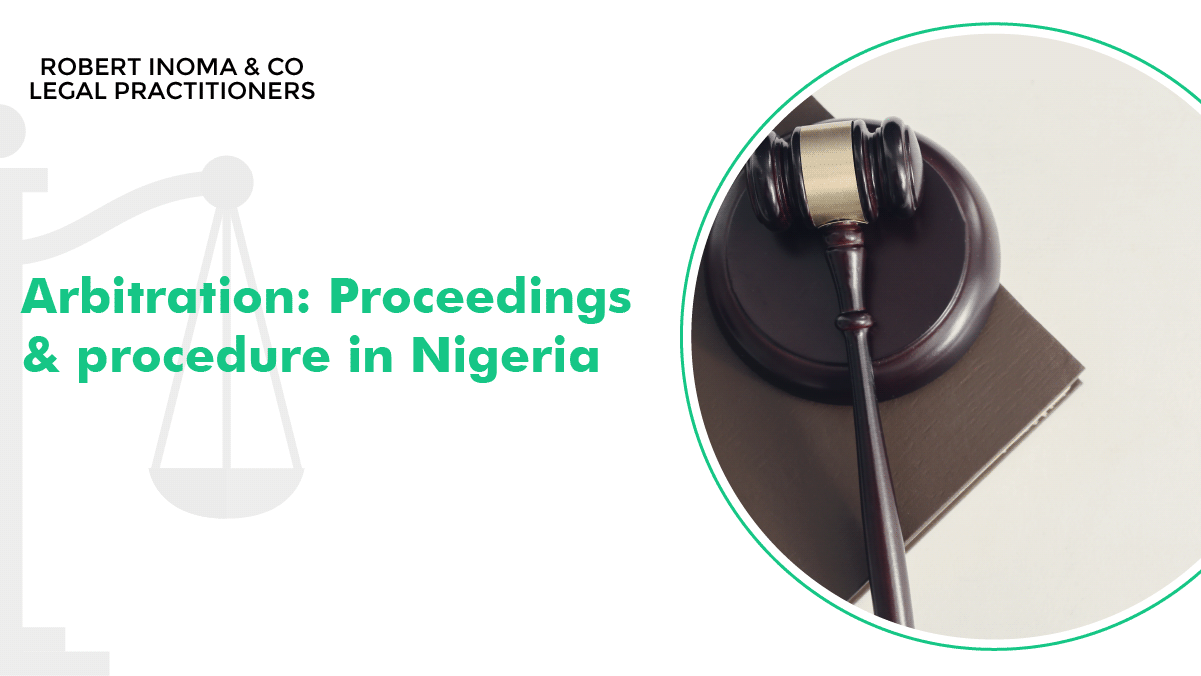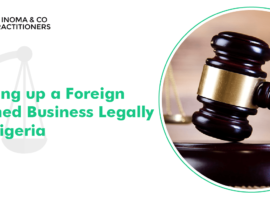Arbitration in Nigeria: Proceedings & Procedure
Arbitration is a procedure for dispute resolution. It is carried out outside the courts and resolved by one or more people (arbitrators) who make a binding decision with the arbitration award. An arbitration award legally binds the resolution decision on both sides and is enforceable in court.
More often than none, arbitration is used by corporate organizations and businesses to help resolve conflicts in trade and commercial proceedings. Disputes are bound to arise from commercial trading and proceedings and they will need litigation. Arbitration is an alternative means to resolve disputes. Instead of taking the matter to an actual court where the judges are randomly allocated and the procedure is strict and rigid, people opt-in for an arbitrator. An arbitration setting is unique and adjusts depending on the case. The arbitrator in arbitration could be selected by the parties of the case. The location for the mediation can be chosen by the parties involved, but the relevant law and tenets of the system are followed.
Nigeria makes use of arbitration as an alternative to the Court’s Dispute Resolution. Arbitration in Nigeria is governed by the Arbitration and Conciliation Act 1988(ACA). This Act is used in every arbitration across the country except in Lagos which has its own arbitration law – The Lagos State Arbitration Law, 2009 (LSAL).
Nigeria garners its Arbitration Law from both the international and local statutes. The international statutes include; the UNCITRAL Model Law, the UNCITRAL Arbitration Rules, and The New York Convention. The local statutes include The Arbitration ACT 1914; and The Arbitration and Conciliation Decree 1988.
Contents
Requirements for Arbitration in Nigeria
The Arbitration and Conciliation Act 1988(ACA) provides essential legal requirements for arbitration agreements in Nigeria. According to Section 1 of the ACA, every agreement has to be in writing and signed by both parties.
The ACA also states that the agreement must contain;
- A document by both parties;
- An exchange of letters, correspondences, telegrams, or other means of communication that provides a record of the arbitration agreement; or
- Exchange of certain points of claim and defence.
According to the ACA “The reference in a contract to a document containing an arbitration clause shall constitute an arbitration agreement if the contract is in writing and the reference is such as to make that arbitration clause part of the contract”.
A resolution must be reached in every arbitration as stated in section 2 of the ACA. Except a contrary intention is given during the arbitration agreement or by the agreement of the parties or by leave of the judge or a court. No provision in the ACA allows a union of any third party in the ACA. However, the LSAL (applicable to only Lagos State) makes provision for it, provided the application is made in writing and with the consent of the parties.
Disputes That Can/Cannot Be Settled by Arbitration in Nigeria
In Nigeria, not all disputes can be settled through arbitration. According to the ACA, the following disputes can be settled by arbitration:
- Matrimonial causes
- Breach of contract
- Compensation for acquisition of land.
- Tort
These disputes, on the other hand, cannot be settled through arbitration:
- Disputes involving the interpretation of the constitution or other statutes.
- Disputes involving crime
Proceedings of Arbitration
The proceeding of arbitration is similar to the court trials where examinations of witnesses and evidence are done. According to Section 15 of the Arbitration and Conciliation Act (ACA), this is the arbitral proceeding:
“The arbitral proceedings shall be by the procedure contained in the Arbitration Rules set out in the First Schedule to this Act”.
Where the rules referred to in subsection (1) of this section contain no provision in respect of any matter related to or connected with a particular arbitral proceeding, the arbitral tribunal may, subject to this Act, conduct the arbitral proceedings in such a manner as it considers appropriate to ensure a fair hearing.
The power conferred on the arbitral tribunal under subsection (2) of this section shall include the power to determine the admissibility, relevance, materiality and weight of any evidence placed before it.”
In cases where the tribunal for arbitration creates its own proceeding rules, such rules can be derived from the national law or formulated. However, the arbitral tribunal must follow the required rules of the nation’s laws.
All parties in the arbitration are to be given equal treatment and chances in introducing their cases, as stated in Section 14 of ACA. The tribunal decides the venue of the arbitration with respect to the issue and the parties’ convenience.
The Procedure of Arbitration in Nigeria
According to the Arbitration and Conciliation Act, there are procedural stages that must be followed in every arbitral proceeding in Nigeria. They are:
- Constitution of the tribunal.
- Issuance of communication of the notice of arbitration- It must be issued by the claimant in the prescribed format to the respondent with at least 30 days’ notice.
- Presentation of cases, documents, and evidence by parties involved.
- Meetings – it includes pre-hearing meetings, preliminary meetings, an inspection of documents, and others.
- Hearing and determining preliminary issues.
- Re-hearing- In the case where an arbitrator is replaced, a re-hearing may be made. It is only mandatory when the sole or preceding arbitrator is replaced. In other cases, re-hearing will be at the discretion of the tribunal.
- Final submissions.
- Publication of the final decree of the tribunal to the parties.
Each party in the arbitration can appoint the arbitrators of their choice, as stated in the ACA. However, the arbitrators must be independent and impartial. The arbitrators shall also disclose any instance that can affect their judgment or make them impartial. The chosen arbitrators also need to have the required experience and qualification as contained in the arbitration agreement. In the case where the parties disagree on the method of appointment of the arbitrators, or the method fails, the court will appoint the arbitrators for the case.
Conclusion
Arbitration is an alternative method to resolve disputes. It can be used when there’s a breach in an agreement, matrimonial issues, land acquisition compensation, or tort. It cannot be used for criminal cases and other offences. In Nigeria, arbitration is governed by the Arbitration and Conciliation Act 1988(ACA) which is used all over the country except in Lagos where the Lagos State Arbitration Law, 2009 (LSAL) is used. Although arbitrations are less rigid when compared to court dispute resolutions, there are proceedings and procedures from the ACA and LSAL that must be followed in every arbitral proceeding.
Robert Inoma & Co. has experienced lawyers and attorneys in corporate law that can assist you in arbitration and dispute resolution. We also have experienced lawyers in trademark services, patent design registration, taxation, and advisory services. Visit www.robertinomalaw.com today




